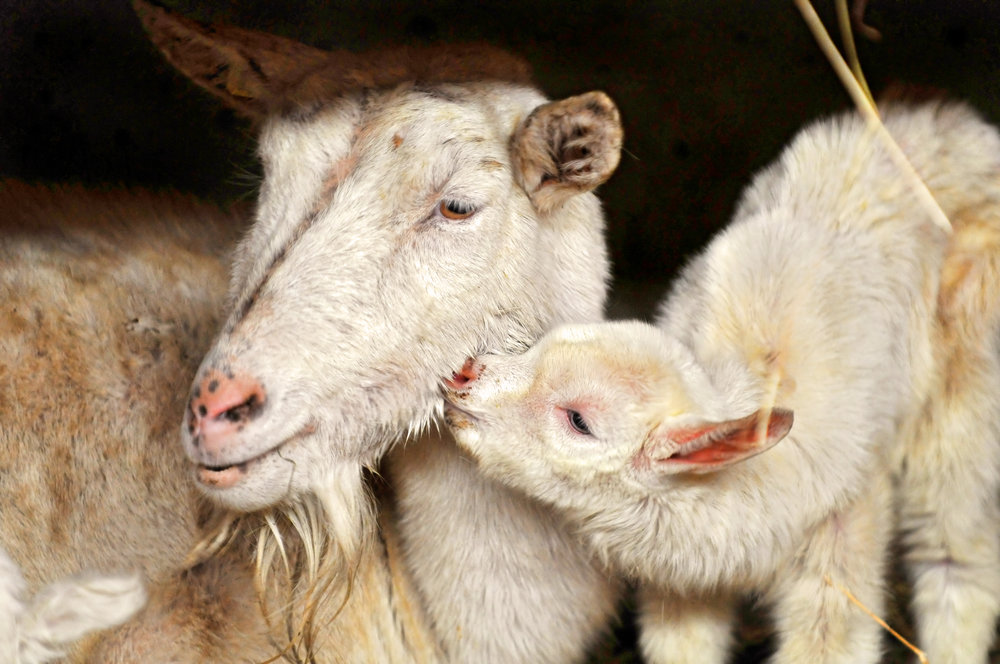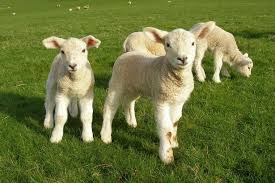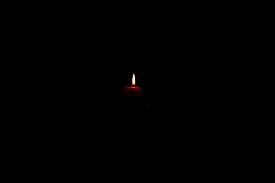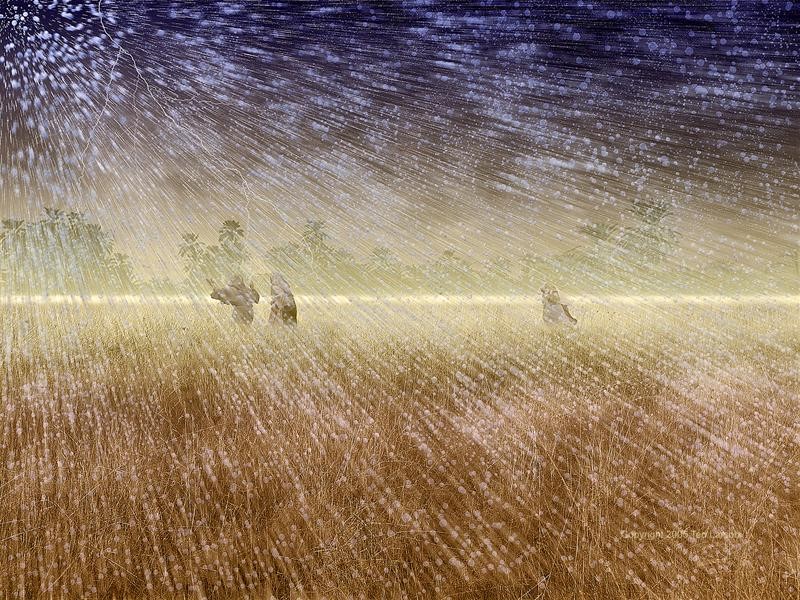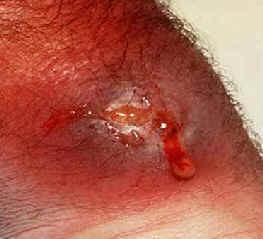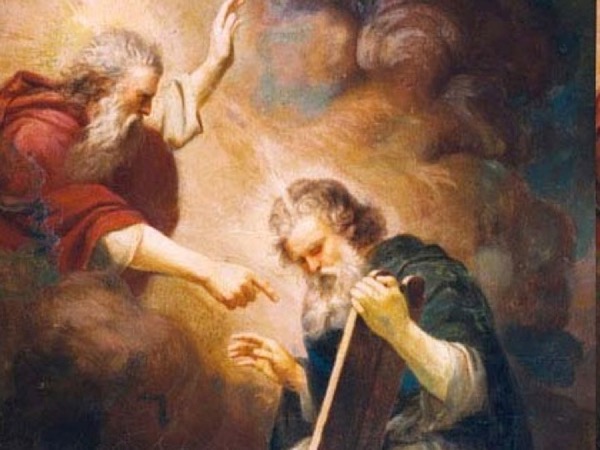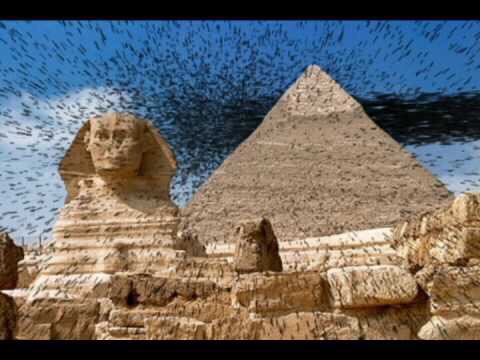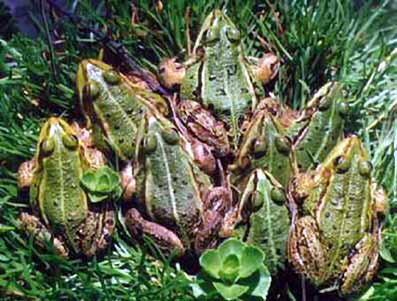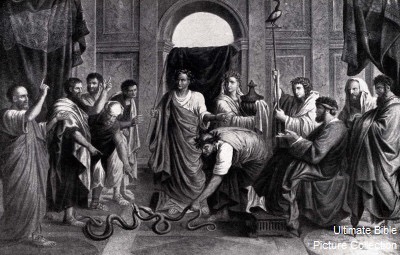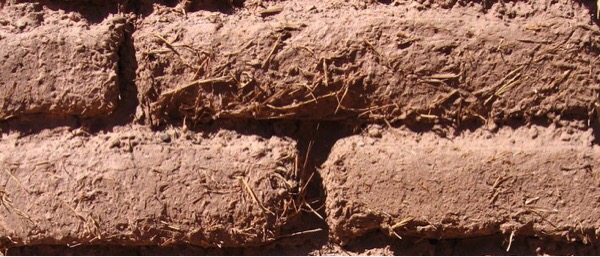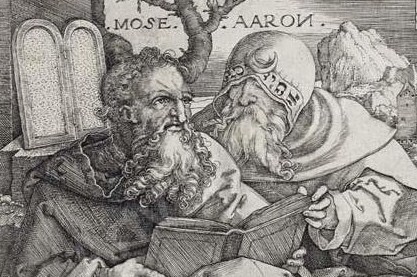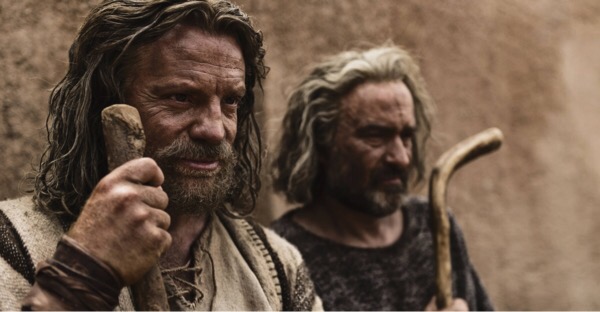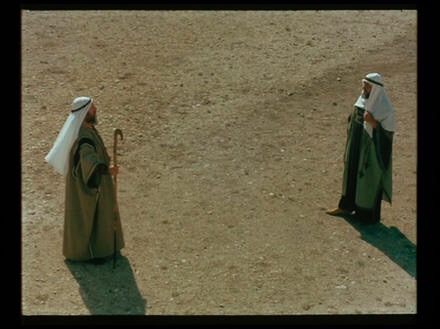ALIVE: Chapter 62 The Holy Baptism of Israel
/Genesis 32:28
Then the man said, “You shall no longer be called Jacob, but Israel, for you have striven with God and with humans, and have prevailed.”
“Evangeline.” whispered an ethereal little voice.
“Who said that?” I replied.
“It’s me, Gracefeld; how can you not recognize my voice since you are who gave me voice?”
Trying to act nonchalant, I said to the air, “Ah! Gracefeld, nice to meet you; what is it?”
“I must point out that in Chapter 6, you fell short of your objective;” answered the angel sternly, then added, “how could you write about the crossing of the Red Sea in only one or two paragraphs? Take your readers in there. Let them feel the spray of water on their faces; let them know that it wasn’t just a mere escape, but rather a mass baptism of Israel the likes of which the world has never seen and will never see again. Now get to work!”
“Wait, don’t go!” I begged. “Why do you call it a baptism? Did they ask for it? Did they seek to repent of their sins; did the crossing remit their sins?”
“My dear, you have so much to learn.” replied Gracefeld sympathetically. “You of all people remember the iconic baptism which was Noah in the ark. Did they repent? John’s baptism used repentance as the reason for the people’s rebirth, for their transformation into children of the most high God.
Baptism is rebirth. Even Christ knew He needed a rebirth, the mark of a new life and was voluntarily baptized. You know almost nothing about His life before, because it had been so different. There wasn’t anything to say about it. Christ mandated baptism because the second birth is as vital to immortality as the first was to mortality.
The people Israel, each one of them individually and together as a nation, via water were reborn, just as Noah’s family was reborn, just as you were reborn as an infant.
After the miraculous crossing, there was no turning back for Israel, as there is no reentering the womb, as Noah’s family could not return to the old world. Illuminate the event as you do. One or two paragraphs! What a failure on your part!”
“Wait! Will you help me?”
“Not me, no. Don’t fret, the words will come as surely as that sun arrives to erase the darkness you start out in every morning. Yield yourself to the words. I must go and assume my own position in the story. Treat me kindly please.”
“Wait! As long as you are here, I have a burning question.”
“Okay, but ask me quickly. You really should wake up earlier you know.”
“I know. Sh. Isn’t it peculiar to call a whole nation after one man? Israel. It’s like calling a country Harvey.” I asked as succinctly as I could.
“Ah! We don’t have the time to discuss the concept of ‘out of one many, and out of many one!’ You’re American. Think about it! Israel was named by God. He is a man, he is a plethora of man, he is a country. He strives with God and man, and prevails. Israel grew from the seed that was one man and then twelve tribes and from there, a nation. And today, he is baptized in the Red Sea to mark his rebirth in God’s will. Now get on with it!” And as mysteriously as Gracefeld appeared, the angel vanished and I was left to go back to the Red Sea just as we were about to cross it...again.
...
Perambula in the pillar of cloud lead the exodus of thousands of Israelites out of Egypt. They were as loud as a giant swarm of bees. Children whined, ladies chattered, cows mooed, dogs barked, roosters crowed, thousands of feet shuffled. Perambula in the pillar started in a straight line out of their homes in Goshen.
“Perambula!”called God to His angel.
“Yes Lord, how am I doing?”
“I want you to steer this group around, send it back towards the sea at Pihahiroth; I will let Moses know that it’s okay. I want the Egyptian army to think we are wandering aimlessly, but I don’t want Moses to think that.”
“May I ask You why we can’t just take the straight and faster route to get out of here before the army of Pharaoh overtakes us? I admit that I am a little concerned for these people. They are difficult to steer.”
God wondered when to inform His angel of His grand plan and then said, “Trust me angel; I am about to shock both Israel and Egypt one last time to prove that I am the Lord God who is freeing Israel from the bonds of his oppressor. Now take that cloud to the sea!”
“Yes, my Lord.” and with that Perambula pushed and blew until the luminous cloud made a giant u-turn. The sounds of chattering grew louder and louder still as the mass, one person after another commented with curiosity and skepticism on the change in direction.
The appearance of wandering had its desired affect. “My Lord!” In rushed a courtier into Pharaoh’s throne room disturbing his moaning and fretting. “I bring a good report!”
Pharaoh looked up as a man starving for good news, about to breathe his last.
“The Israelites are lost! They don’t seem to have any idea of where to go, and they have ended up in front of the sea. They have cornered themselves!”
“That is good news. We must fetch them and bring them back immediately. They have had enough of their freedom. They don’t even know what to do with it. And they must be thirsty by now too. Israel will be easy prey.” said Pharaoh with the glee of a salivating lion. “Assemble the entire army and prepare my chariot. We are going to bring back our delinquents! Didn’t they ask for only three days! Meet me in front of the palace. Be quick about it!”
Pharaoh’s despondency turned to ebullience. Thoughts of his dead son burrowed deep in his soul, so deep they were forgotten by his mind. He was now the conquering general about to lead his army to victory. A rag-torn adversary against the greatest army civilization has known was an unfair match, but that didn’t diminish Pharaoh’s thrill of pursuit. It only made it stronger because he knew that he would win this time.
Within an hour every horse and chariot in the army, in full uniform, with polished spears and bayonets and with Pharaoh in the lead were galloping to the sea, fueled by exhilaration and confidence.
Israel on the outskirts of the mass, heard the thunder of horses hooves and looked at the horizon to see the army in hot pursuit. Fear and panic spread through the crowd like a virus. “We are doomed!” cried a sixty year old Reubenite.
“Let’s surrender quickly before we are harmed, and return to serve him. It wasn’t such a bad life. Heads nodded in agreement as the decision to surrender became consensus among the tribes.
By the time that opinion reached the ears of Moses who stood closest to the sea, he too wondered what to do. Suppressing his concern, Moses said, “Don’t be afraid, see what the Lord will do. The Lord will fight for you, keep still.” But to the Lord Moses sang a different song. He looked around for options and saw none. Then he said, “Lord, your cloud cornered us. How can we escape? Did you lead us here only to be slaughtered?”
“Why are you crying out to Me.” replied the Lord.”Lift up your staff, stretch out your hand over the sea and divide it so Israel can walk on dry ground.”
‘Divide the sea?’ thought Moses, but he caught himself before adding, “That’s impossible!”
Instead, Moses took a deep breath, looked up into the heavens for a sign; saw none, lifted his right arm with hand clenched around the staff. Suddenly a mighty wind, a wind never before and never again to be duplicated swept up from the east. Small objects took flight. Mother’s clutched their infants. Chickens squawked. The sun fell onto the horizon. It was surreal. But the wind also mysteriously blew away fear and complaints.
Perambula and Gracefeld repositioned their pillars of cloud and fire from the lead to behind Israel to form a rampart nestling Israel into a safe and secure space from which man, woman, and child could regain their composure. Perambula filled the clouds with bright light so Israel could see with daylight eyes the widening path created at his million feet.
All night long Perambula and Gracefeld held back Pharaoh’s army so it could not reach Israel.
Israel walked in dusky light through the Red Sea corridor with watery walls spraying a refreshing mist onto the faces of the numb multitude while the mighty wind roared to push the people through and blow away any inkling of trepidation that would have made them surrender to their familiar taskmasters.
Moses, his brother and sister, his wife and sons lead the congregation of Israel on the miraculous trek through the sea. It was the iron clad faith of one man, Moses, that caused a chain reaction so strong that faith grew and grew as it was passed down the line to the very last family. Men, their wives and children felt the soggy earth beneath their feet. It was like walking on the narrow wet sea shore without the wide dry beach to go to.
The wind that formed the magical corridor was created by a plethora of powerful spirits. It was a warm wind, and it pushed the mass of marchers along through the sea so that no one felt resistance, but rather as if he or she was being swept through.
“Look ahead!” shouted Moses. “Do not look at the water! Pass it down.”
Echoes of, “Look ahead! and Faces front!” echoed through a mile of souls. The people were too numb to entertain doubts that they would make it through. Even the most stubborn skeptic didn’t dare doubt that he would make it to the other side of the sea.
Moses who had experienced many supernatural events since the day that God spoke to him from the burning bush was confident that God had created this temporary highway to freedom, this short cut to safety just for them. Every step of the way detached the people from Pharaoh, in body and in soul.
Eliezer clutched the bundle of bones of Joseph close to his heart. Gersam and a band of young men stood on the sidelines as the people passed shouting the message, “Look ahead! Don’t look at the water!”
Moses was glad it was night time when the darkness made it easier to be blind to the weird corridor walls. The warm and mighty wind at their backs was the Spirit of God-almighty Who was creating a way where there was no way. He was shepherding His precious people through the valley of the shadow of death for the first time.
Miriam was among the first to reach the beach. The sight of miles of shore to her left and right made her heart skip. She took a few deep breaths to try to regulate it again. Long red streaks appeared in the dark night sky. The sun was about to rise. She was an old woman, more than ninety years of age, but she wept like a baby. Aaron held her arm, and said, “Come sister, there is a rock, let me take you to sit. It will be a long time before the rest of the people arrive. You may even want to try to sleep.”
“Thank you Aaron, I could no more sleep than I could do cartwheels right now. Yes, take me to that rock.”
Every minute that went by more and more people arrived. Cows and oxen, chickens and sheep too were mixed in with the rich families of Israel.
“Look at the sun mommy!”shouted a little girl with glee. Indeed daybreak heralded the arrival of the pilgrims to the eastern shore.
“Move back, don’t linger here, make room for more people! Move back!” A few young men took it upon themselves to usher the pilgrims onto dry ground. First steps out of the sea were like taking first steps on the Moon. The relief of arrival and wonder at new surroundings was commonly felt by young and old.
Meanwhile, just as the sun filled the sky with day, the Lord and Perambula and Gracefeld in their pillars of fire and cloud looked down upon the Egyptian army still in pursuit of Israel. By then pharaoh’s army was deep into the corridor of the sea, closing in on the older Israeli stragglers. Suddenly, God through the Egyptians into a panic. He clogged their chariot wheels so they turned with difficulty.
Terror swept through the army of Pharaoh. A soldier shouted, “Let’s flee, for the Lord is fighting with them!” Realization that they were in pursuit of the God who killed their firstborn terrified them.
While horses were being whipped to pull their chariots out of the mud, and the Israelites were all safely on the eastern shore, the Lord instructed Moses to stretch out his hand over the sea. Moses peered into the path of their salvation to see in the distance the struggling pursuers and slowly lifted his hand clenching the staff.
The walls of the magical path melted to erase the highway of the salvation of Israel. Within twenty five minutes the sea returned to its normal depth. Several of the heartiest soldiers which had almost made the crossing washed up on shore, as dead as their drowned compatriots whose bodies were being tossed by the current. Not an enemy was left to threaten God’s people.
Thousands of wide Israeli eyes looked back to stare at their path as it slowly submerged under water. Some saw in the distance arms and legs flailing and heard horses neighing and chariots breaking.
That which they didn’t dare to fear, drowning, was befalling the army of Pharaoh. That which they convinced themselves would not happen, was indeed happening to those who would have captured them.
As in the days of Noah, water was the cause of death and new life. All of Israel began its new free life with baptism in the bloody Red Sea.
Perambula and Gracefeld with a congregation of sub-angels wafted through the party soaking in the joy and blowing away random evil spirits that would spoil the moment.
They laughed. They danced. They cried. They sang new songs. Miracle of miracles.
Two days of merriment gave God’s nation time to catch their breath and continue their journey east to the land that was promised to Father Abraham centuries before, and to them.
Israel was renewed.
“Now, that’s more like it, Evangeline.” whispered Gracefeld. And I smiled, relieved to be approved by one of my favorite, most respected angels.



